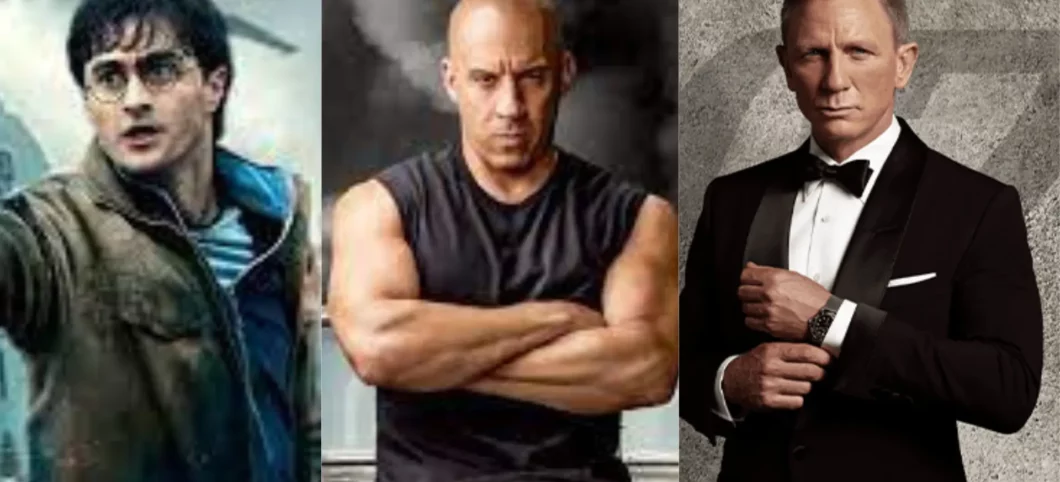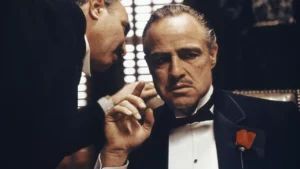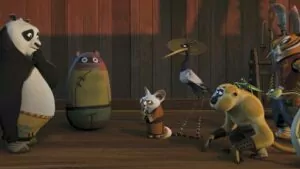
In the ever-evolving world of Hollywood, franchises have become the lifeblood of the industry. From superheroes to beloved classics, studios are constantly on the hunt for the next billion-dollar series to rival the likes of Disney. This relentless pursuit has led to a flood of reboots, sequels, remakes, and adaptations, leaving audiences both excited and exhausted. Recently, the film industry has witnessed a curious trend: the revival of classic franchises from the ’80s, ’90s, and 2000s. While some of these revivals have succeeded, others have fallen flat. In this article, we’ll focus on franchises that have stubbornly refused to fade away, even in the face of adversity. We’ll explore why these franchises persist, their ups and downs, and whether or not they should finally let go.
1. Harry Potter Saga
Recently, the announcement of a Harry Potter Saga reboot took the world by surprise. HBO Max plans to transform J.K. Rowling’s beloved series turned into a 10-season TV show, covering all seven books. This news came more than a decade after the original film series concluded in 2011. While the films were a massive success, many questioned the need for a reboot so soon. The allure of Harry Potter lies in its magical world, endearing characters, and a generation of fans who grew up with the books and films. The original film series, despite some deviations from the source material, captured the essence of Rowling’s universe and became a cinematic milestone.
The question that lingers is whether a reboot can capture lightning in a bottle once more. The risk of disappointing die-hard fans looms large. While revisiting Hogwarts and its inhabitants is undoubtedly exciting, it’s essential to tread carefully. Reboots can be a double-edged sword, potentially tarnishing the legacy of the originals if not executed with care. The hope is that HBO Max’s adaptation will bring fresh perspectives and a faithful reimagining while avoiding the pitfalls of simply retreading old ground. Only time will tell whether this ambitious endeavor will reignite the magic of Harry Potter or dim its luminescent charm.
2. Twilight Saga
Lionsgate revealed plans for a Twilight Saga TV show, just 11 years after the film series concluded. This quick turnaround left fans both intrigued and bewildered. Twilight, based on Stephenie Meyer’s vampire-themed novels, had its moment in the sun during the late 2000s, gaining an enormous following among young adults. The original film series starred Kristen Stewart as Bella Swan and Robert Pattinson as Edward Cullen, captivating audiences with their on-screen chemistry. However, by the time “The Twilight Saga: Breaking Dawn – Part 2” wrapped up in 2012, the vampire craze had waned. Fans moved on to new obsessions, and the franchise took a backseat.
The decision to revisit Twilight as a TV series is a perplexing one. While the books have a dedicated fanbase, it remains to be seen if the story can regain its allure in a different medium. The original films, though successful, were often criticized for their wooden acting and melodramatic moments. Lionsgate faces the daunting challenge of breathing new life into the franchise while overcoming these hurdles. Nostalgia may draw some viewers back into the world of vampires and werewolves, but it’s essential to offer a fresh perspective and narrative to reignite interest and keep the Twilight Saga from feeling like an overplayed song on the radio.
3. Men In Black
Next on our list is the Men in Black franchise. The first two films, starring the iconic duo of Will Smith and Tommy Lee Jones, were a resounding success, blending humor, sci-fi, and action into a unique and entertaining package. These movies introduced audiences to the secret world of extraterrestrial immigration enforcement and became a cultural phenomenon. However, by the time “Men in Black 3” hit theaters in 2012, it was evident that the franchise was showing signs of wear and tear. While it performed reasonably well at the box office, critics and fans alike found it lacking the magic of its predecessors.
Inexplicably, Sony and Columbia Pictures attempted to breathe new life into Men in Black with a proposed crossover film with “21 Jump Street.” The idea of combining these two vastly different franchises raised eyebrows and garnered attention, but the project eventually faded into development limbo. Sony’s next move was a reboot, “Men in Black: International,” which aimed to recapture the charm of the original films with new agents portrayed by Chris Hemsworth and Tessa Thompson. Unfortunately, the movie fell flat, failing to recapture the spark that made the first films memorable. While the Men in Black universe may have seemed limitless in its potential, the franchise is a relic of a bygone era. It’s time to hang up those neutralizer sunglasses and let this one rest in peace.
4. Jurassic Park
Jurassic Park, directed by Steven Spielberg, is hailed as a cinematic masterpiece. When it first hit theaters in 1993, it left audiences in awe of its groundbreaking use of CGI and animatronics to bring dinosaurs to life. The film’s success was unparalleled, and it launched a franchise that has since struggled to replicate its initial magic. The original film was followed by two sequels, “The Lost World: Jurassic Park” and “Jurassic Park III,” both of which received mixed reviews. Despite these setbacks, Universal Pictures decided to resurrect the franchise with “Jurassic World” in 2015. While the film was financially successful, it failed to capture the awe-inspiring wonder of the first movie.
“Jurassic World: Fallen Kingdom” continued the story in 2018, but it was met with a lukewarm reception. The franchise now stands on shaky ground, with “Jurassic World: Dominion”. The question remains: how many times can the concept of cloned dinosaurs wreaking havoc be recycled before it becomes stale? The awe and wonder of seeing dinosaurs on the big screen have lost their novelty, and it’s time for the Jurassic Park franchise to evolve or face extinction.
5. Charlie’s Angels
Charlie’s Angels may seem like an odd inclusion on this list, but the franchise’s persistence in Hollywood is noteworthy. Originating as a popular TV series in the 1970s, Charlie’s Angels quickly became a cultural phenomenon. The show’s appeal lay in its unique take on action and its charismatic female leads. However, when ABC attempted a spin-off series called “Tony’s Boys,” which essentially gender-swapped the concept, it failed to capture the same magic. Despite this setback, Hollywood couldn’t resist revisiting the franchise in 2000 with a campy action film starring Drew Barrymore, Cameron Diaz, and Lucy Liu.
This rebooted film spawned a sequel and eventually led to a 2011 TV series, which was canceled after just four episodes due to abysmal ratings. Still, the fascination with Charlie’s Angels persisted, culminating in a 2019 film starring Kristen Stewart, Naomi Scott, and Ella Balinska. Unfortunately, this modern take on the franchise received a lukewarm reception at best. The lesson here is that some concepts are best left in the past, as attempts to resurrect them only highlight their outdated appeal. Charlie’s Angels served its time well in the ’70s, but it’s time to retire the angels gracefully.
6. James Bond
James Bond is one of the most enduring franchises in film history, dating back to 1962 with “Dr. No.” Over the years, this British secret agent has undergone multiple actor transitions, with a total of 27 films in the main series. However, the franchise’s heyday, characterized by classics like “Goldfinger” and “From Russia with Love,” feels like a distant memory. Recent Bond films have been hit or miss, with only a handful earning critical acclaim.
The challenge lies in finding ways to keep the Bond franchise relevant in a rapidly changing world. While the iconic character continues to captivate audiences, the formulaic storytelling and reliance on familiar tropes have left some fans yearning for fresh ideas. The success of the John Wick franchise, with its innovative approach to action and storytelling, further highlights the need for Bond to evolve or risk becoming irrelevant. Bond’s suave charm and license to kill will always have a place in cinema, but it’s high time the franchise reinvents itself for a new era.
7. Fast and Furious
The “Fast and Furious” franchise has redefined the action genre, offering audiences an adrenaline-pumping ride filled with high-speed chases, elaborate heists, and a diverse ensemble cast. What began as a humble street racing film in 2001 has since ballooned into a global phenomenon. However, as the franchise expanded, so did its ambition, sometimes to its detriment. “Fast and Furious” became synonymous with audacious stunts and gravity-defying action sequences that stretched the limits of believability.
While the early films focused on the underground racing scene, later entries saw the crew take on international espionage and battle superhuman adversaries. While these shifts in tone garnered box office success, they also alienated some fans who yearned for the simpler days of street racing. The franchise’s future remains uncertain, with promises of concluding it with “Fast X” and its sequel. Still, with spin-offs and potential new trilogies on the horizon, it’s clear that “Fast and Furious” is in no hurry to slam on the brakes. The challenge now is to strike a balance between maintaining the franchise’s signature action spectacle and offering a compelling narrative that resonates with fans old and new.
8. Terminator
The “Terminator” franchise, born from James Cameron’s iconic 1984 original and its acclaimed 1991 sequel, “Terminator 2: Judgment Day,” has been on a relentless quest for rejuvenation since the late ’90s. Despite the franchise’s undeniable brilliance early on, subsequent entries, like “Terminator 3: Rise of the Machines” and “Terminator Salvation,” struggled to recapture that magic. Reboots and sequels like “Terminator Genisys” and “Terminator: Dark Fate” failed to reignite the franchise, with audiences growing tired of the same old formula. Now, with talks of a complete reboot, it may be time to let the “Terminator” rest in peace, preserving its legacy rather than continuing to tarnish it.
9. Alien
The “Alien” franchise, launched by Ridley Scott’s 1979 horror masterpiece and further propelled by James Cameron’s 1986 action-packed sequel, “Aliens,” once stood as a genre-defining force. However, it suffered a series of missteps with entries like “Alien 3” and “Alien: Resurrection.” Attempts at revitalization, such as the “Alien vs. Predator” films, deviated from the series’ core horror roots. Ridley Scott’s return with “Prometheus” and “Alien: Covenant” proved divisive. With uncertainty surrounding the franchise’s future and countless project changes, the time may have come to allow “Alien” to retire gracefully, preserving its legendary status.
The Movie Culture Synopsis
In the ever-evolving landscape of cinema, franchises play a pivotal role in shaping pop culture. From captivating us with groundbreaking stories to sparking endless debates among fans, they’ve etched themselves into our hearts and minds. However as we’ve witnessed, franchises in the pursuit of endless sequels and reboots often dilute the magic that once made them extraordinary. It’s time for Hollywood to take a cue from franchises like “Harry Potter”, which recognized the importance of concluding their sagas on a high note, cementing their places in cinematic history. As we bid farewell to these cinematic legends, let’s cherish the memories, quotes, and characters they’ve gifted us over the years. And who knows, perhaps in the future, a new generation of filmmakers will come along, ready to pay homage or breathe fresh life into these beloved stories. Until then, let’s remember that sometimes, the most profound way to honor a franchise is to let it conclude its journey with the dignity it deserves.



